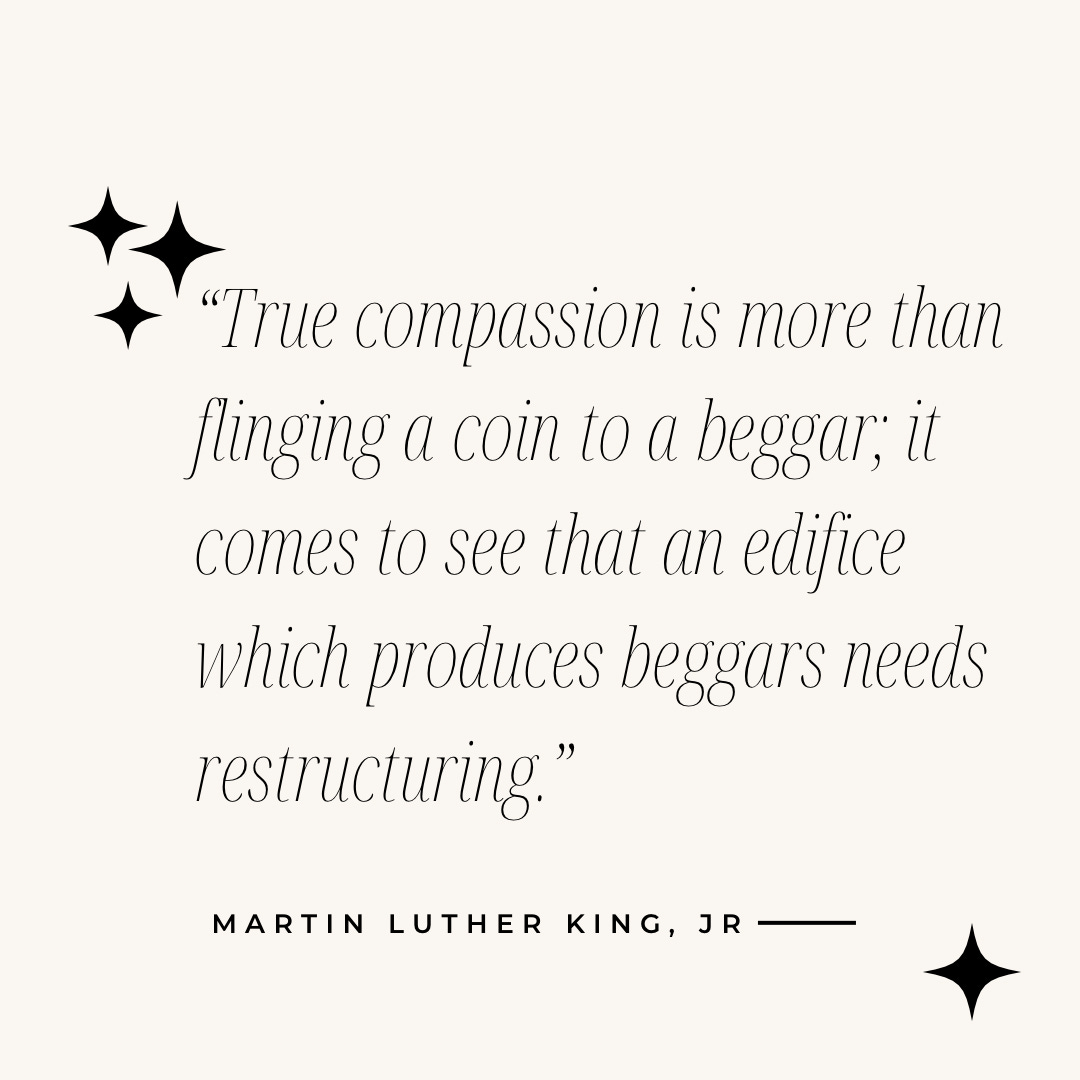Exploring and Imploring Compassion: Martin Luther King Jr.’s Legacy Endures
Exploring how Martin Luther King's legacy of peace, kindness and compassion inspires progress on a personal and societal level in 2025.
Like many writers, penning introductions is the bane of my existence.
To succinctly introduce an entire series exploring compassion and its relation to humanity throughout time?
Somehow worse and bitchier.
I was introducing compassion without exhibiting compassion.
Studying modern society’s warped sense of humanity evoked my inner bitch quite loudly.
And rage doesn’t encourage compassion.
MLK Day: Compassion’s Holiday
Fortunately, America reminds us to be compassionate once a year.
Every year, on the third Monday in January, we celebrate in reverence and honor the legacy of a contemporary American hero: Martin Luther King, Jr., (MLK).
There are many wonderful privileges to being an American - one of them is studying lessons of King, a genuine great American treasure.
Primarily known for his social activism, steadfast mission against racial discrimination and influence on the civil rights movement in America, MLK advocated for achieving progress through peaceful protest while emphasizing knowledge and empathy for one’s opposition.
A Baptist minister, MLK epitomized kindness and compassion for humanity across the globe, applying his philosophies to conflicts at home and abroad, including the Vietnam War, until his assassination in 1968.
Applying MLK’s compassion today
Martin Luther King’s philosophies can still be applied today - when applied correctly.
Acknowledging the simplification of King’s philosophy for our purposes, two major components of compassion stand out:
To understand your opposition to their humanity and their flaws, to understand them is to understand yourself - the best path to true progress, peace and the elevation of humanity.
Compassion requires one to take action upon empathy. It is neither enough to merely feel for another’s suffering, nor to mindlessly throw them a coin. “Holding space” in your own heart for another person’s pain and acting authentically to alleviate their suffering. This means compassionate acts cannot be empty or forced.
Sixty years later, I dare to add a footnote: compassion should not be trendy.
Compassion is not a trend.

Thanks to modern technology, especially social media apps, many seemingly compassionate messages are embedded in users’ minds, whether accurate, comprehensive or fair.
Over the past decade, we’ve seen thousands of protestors yelling, marching and emoting their hearts out for various causes.
While crying out and standing up for the persecuted and suffering is admirable, the lack of education, understanding or basic knowledge can be astounding.
No matter which side one takes on the Israeli-Palestinian conflict, one ought to know which river and which sea before blaring an opinion across the globe.
Such a basic concept applies to so many sides of so many divisive issues.
This brings us back to Martin Luther King, Jr:
If one must understand the opposition - the other side’s motives, emotions and questions - certainly, one must also know the “who” and “where” of the opposition.
At the very least, it’s helpful to know the location of those for whom you advocate.
Applying MLK’s philosophies in 2025

Before lashing out at the perceived opposition, ask yourself, in this order:
What do you verifiably know about the other side?
Do you know the axiomatic, credible facts?
Do you know the basic information?
Are you willing to listen to the opposing argument, if delivered rationally and peacefully?
Are you willing to learn enough to change your own mind?
What do you verifiably know about your position (not feel, but know)?
Would you be more impactful by knowing and understanding the opposition?
These are bigger questions to explore.
For today, in honor of Martin Luther King Jr.’s memory, please:
Focus on your local community by volunteering this week.
Be aware of your compassion level on a during daily interactions.
Note for whom you feel empathy throughout the day.
Perform a meaningful act of compassion to meaningfully alleviate another’s pain or suffering - whether it be by volunteering, donating to and recognizing the humanity in the homeless, supporting a loved one emotionally or simply sending a friend words of support.
At the very least, on any day, try studying MLK.
Where Do We Go from Here: Chaos or Community by Martin Luther King, Jr.
The Autobiography of Martin Luther King, Jr. by Martin Luther King, Jr.
Wikipedia on Martin Luther King, Jr.
I promise, it inspires compassion.
Upcoming topics we’ll explore during our Compassion Exploration & Imploration (all titles tentative, clearly):
Cultures & Compassion: Studying Compassion Around the World
Worshipping Compassion: Religions of the World on Compassion
Self-care as a Form of Compassion
Literary Compassion: From Aesop’s Fables to Shakespeare and Beyond
Is Modern Dating Compatible with Compassion?
Modern Society & Compassion
Features from various Substack writers
A special thank you to
for his kind editorial feedback - very poignantly delivered. “Bitchier” is my word, not his. Check him out.If you would like to be included as we Explore and Implore Compassion, please send a DM or comment below. Thanks!





Thank you for bringing attention to Dr. Martin Luther King Jr. Day—I’ll admit that I was wrapped up in just one more Monday of the grind and didn’t stop to consider the reason my husband was home from work today. Remembering is the first step in compassion that we don’t take time to do often enough. 🖤
SO stoked for your discussions about compassion in literature!!
And I love that you focused on compassion. Straight to the core